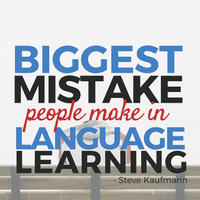Biggest Mistake People Make in Language Learning
The biggest thing that prevents people from succeeding and becoming fluent is that people stay with the beginner material for too long. They stay with the beginner book, course or lesson and never get beyond it. This is quite unnecessary.
If you buy a beginner book, which I think is a good thing to do if you embark on learning a new language, you can use it for a year. Keep on going back to it, but don't try to master it. You don't have to learn or remember the dialogues, the vocabulary, the grammar rules, nothing. It's just an initial guide; something that you go back to regularly. You have to get away from the artificial environment of the beginner textbook, or whatever your teacher has you doing in class, as soon as possible. You have to get beyond it and into real language.
Take my experience with learning Czech as an example. I kept track of the initial stages. I started using LingQ's Bookmark, a quick import system, to bring in articles from Czech newspapers two weeks after I started studying. Fighting my way through these, of course, clicking on every word, saving the words to my database, not really understanding it. I kind of picked my way through maybe 30-40%, most of it unclear to me, but I kept on doing it.
I had brought in something like 161 newspaper articles over three months. I started bringing in The Good Soldier Švejk and then I discovered Radio Prague. So I've read the equivalent of two books in Czech of adult authentic material intended for native speakers. Do I understand it all? No. Do I know all the words there? No. But I know a lot of it because now when I bring in a new text to my account in LingQ I can see that the New Words percentage is smaller. That's just by reading,listening and not expecting to understand it all. Even though I listen two, three, four times, read it two, three, four times I don't understand it, but it is all helping my brain get used to Czech.
The majority of people get the beginner book (I've got a beginner book handy here somewhere) and they never leave it because they never feel comfortable. They don't feel they've learned everything in it. The beginner book is like that step into the swimming pool and then you've got to start swimming. So the biggest mistake people make is that they stay with their beginner material.
It doesn't matter whether you can use the language. It doesn't matter whether you can speak or write yet. What matters is how much can you understand, how many words you know, how familiar you are with the language and to what extent the language is starting to become a part of your brain.
So the big mistake people make is they stay with the beginner book for far too long. Within a month or two or three, depending on the language, you've got to get into the real language and ease your way in. I use LingQ to do this. It works for me.
So there's my advice, don't stay with the beginner material. The sooner you get into the real stuff, the faster you will learn. The objective is not to fully understand something after one or two months. The objective is to understand a lot after eight or 10 months and in order to do that, you've got to push yourself past that comfort level of the beginner book.

